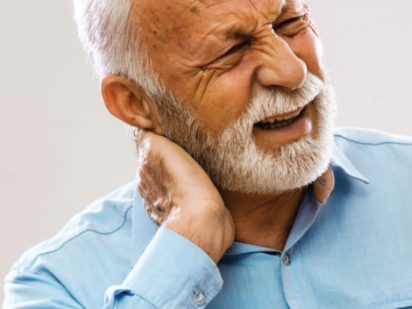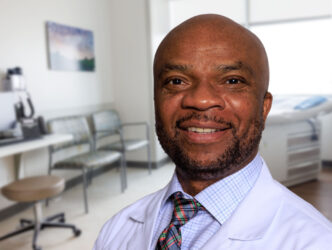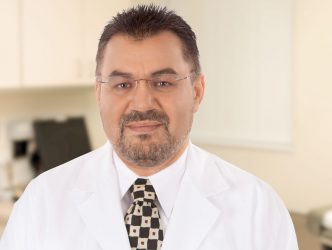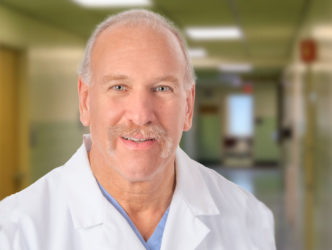Head and neck cancer is an umbrella term that includes cancers of the tongue, tonsil, throat, and voice box. While cigarette smoking and/or excessive drinking are often attributed to causing these, there is another factor that has been become a leading cause: the human papillomavirus, otherwise known as HPV.
Rob Thomas, MD, an ear, nose, and throat doctor with Trinity Health, said that he – as well as other ENT providers globally – have seen a significant increase in HPV-related head and neck cancer. “In the 1990s, 50 percent of oropharyngeal head and neck cancers were attributed to HPV,” he said. “Now, it accounts for 70 to 80 percent.”
Additionally, he noted, patients are being diagnosed at a younger age.
“As a lot of people are aware, the HPV vaccine will prevent this kind of head and neck cancer in anyone that gets it,” Dr. Thomas said. “We’re very optimistic that because of the vaccination efforts against HPV, we will eventually see a decline in these new, HPV-related head and neck cancers.”
However, Dr. Thomas attributes the rise in HPV-related head and neck cancers to the fact that “a majority of patients have not had the vaccine.” He explained that the HPV vaccination is recommended at age 11-12, but it is also approved for adolescents and adults ages 13 to 26.
“Anyone older than that should speak with their primary care provider to see if this is something to consider,” he said, noting that vaccines are available through primary care providers.
In 2021, an estimated 54,010 people will get oral cavity or oropharyngeal cancer, and about 10,850 people will die from it, the American Cancer Society said. Men are twice as likely to develop these types of cancers over women. The death rate for these cancers have decreased over the last 30 years.
In addition to HPV, people who smoke daily or are heavy drinkers – those who have four to five drinks a day – also are at risk for developing head and neck cancers. Dr. Thomas noted that smokers are five to 25 times more likely to develop head and neck cancer as opposed to non-smokers and people who abuse alcohol are five to six times more likely than non-drinkers or those who drink less to develop head and neck cancer. Additionally, he said, those who smoke and drink have “multiplicative effects.”
Things to watch for:
- Mouth sores or bleeding in the mouth
- Persistent sore throat
- Trouble swallowing
- Hoarse voice
- Long lasting cough
- Lump in the neck
- Ear pain (Dr. Thomas noted that one of the frequent symptoms of tonsil cancer is ear pain. “In my opinion, a heavy smoker/drinker that has ear pain needs to come in for a cancer evaluation immediately,” he said.)
If you experience any of these, speak to primary care provider, who can then make a referral to ENT. At the ENT’s office, a scope exam – using a thin tube with a camera and light – is performed to look for possible cancer. If there any concerning findings, a biopsy and further imaging, either through CT, MRI, or PET, is done. “If we do find cancer, the next step is to discuss the various treatment options offered here at Trinity Health including surgery, chemotherapy, and radiation.”
A tumor conference, a meeting of doctors that treat cancer and “everyone who is involved in the care,” is held to decide the best methods of treatment “to get them treated as quickly as possible,” Dr. Thomas said.
To better avoid head and neck cancer, Dr. Thomas advised that quitting smoking, minimizing alcohol intake, and making healthy lifestyle decisions are the best ways. “Unfortunately, with HPV-related head and neck cancer, the vast majority of adults have already been exposed to HPV (though not necessarily the cancer-causing kind) and there isn’t anything to do but monitor for symptoms.”
With HPV-related head and neck cancer, Dr. Thomas noted that the risk of HPV infection is lower, based on the number of long-term sexual partners.
The Centers for Disease Control and Prevention advise the following to help reduce the chances of developing head and neck cancer:
- Don’t smoke. If you smoke, quit. Quitting smoking lowers the risk of cancer.
- Don’t use smokeless tobacco products.
- Limit the amount of alcohol you drink.
- Talk to your doctor about HPV vaccination. The HPV vaccine can prevent new infections with the types of HPV that most often cause oropharyngeal and other cancers. Vaccination is recommended only for people at certain ages.
- Use condoms and dental dams consistently and correctly, which may help lower the chances of giving or getting HPV.
- Use lip balm that contains sunscreen, wear a wide-brimmed hat when outdoors, and avoid indoor tanning.
- Visit the dentist regularly. Checkups often can find head and neck cancers early when they are easier to treat.
Trinity Health Ear, Nose, and Throat includes Alycia Coutts, FNP-C, and Rob Thomas, MD. Their offices are based at Health Center – West, 101 3rd Ave SW, Ste 203, Minot. For more information, call 701-857-5986.




